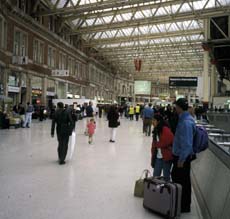Future social disintegration

Wired connections (Mill Park, York, England)

Velocity and change (Bay of Fundy)

Unity asserted (D.C. hotel atrium)

In transit (London)

Subcommunities (Maine)
In his novel Distraction, Bruce Sterling imagines a disintegrated but wired future America:
We had an Atomic Age, but that was dangerous and poisonous. Then we had a Space Age, but that burned out in short order. Next we had an Information Age, but it turned out that the real killer apps for computer networks are social disruption and software piracy. Just lately, American science led the Biotech Age, but it turned out that the killer app there was making free food for nomads! . . .
Political reality in modern America was the stark fact that electronic networks had eaten the guts out of the old order, while never finding any native order of their own. The horrific speed of digital communication, the consonant flattening of hierarchies, the rise of net-based civil society, and the decline of the industrial base had simply been too much for the American government to cope with and successfully legitimate.
There were sixteen major political parties now, divided into warring blocs and ceaseless internecine purges, defections, and counterpurges. There were privately owned cities with millions of "clients" where the standard rule of law was cordially ignored. There were price-fixing mafias, money laundries, outlaw stock markets. There were black, gray, and superbarter nets. There were health maintenance organizations staffed by crazed organ-sharing cliques, where advanced medical techniques were in the grip of any quack able to download a surgery program. Wiretapping net-militias flourished, freed of any physical locale. There were breakaway counties in the American West where whole towns had sold out to tribes of nomads, and simply dropped off the map.
There were town meetings in New England with more computational power than the entire U. S. government had once possessed. Congressional staffs exploded into independent fiefdoms. The executive branch bogged down in endless turf wars in an acronym soup of agencies, every one of them exquisitely informed and eager to network, and hence completely unable to set a realistic agenda and concentrate on its own duties. The nation was poll-crazy, with cynical manipulation at an all-time toxic high -- the least little things produced tooth-gritting single-issue coalitions and blizzards of automated lawsuits. The net-addled tax code, having lost all connection to fiscal reality, was routinely evaded by electronic commerce and wearily endured by the citizenry.
. . . . Decentralization of powers had simply gone too far. A policy once meant to be fluid and responsive had turned into blinding, boiling confusion. Sterling 1998, 86, 100-1
We don't have roots. We're network people. We have aerials. (406)